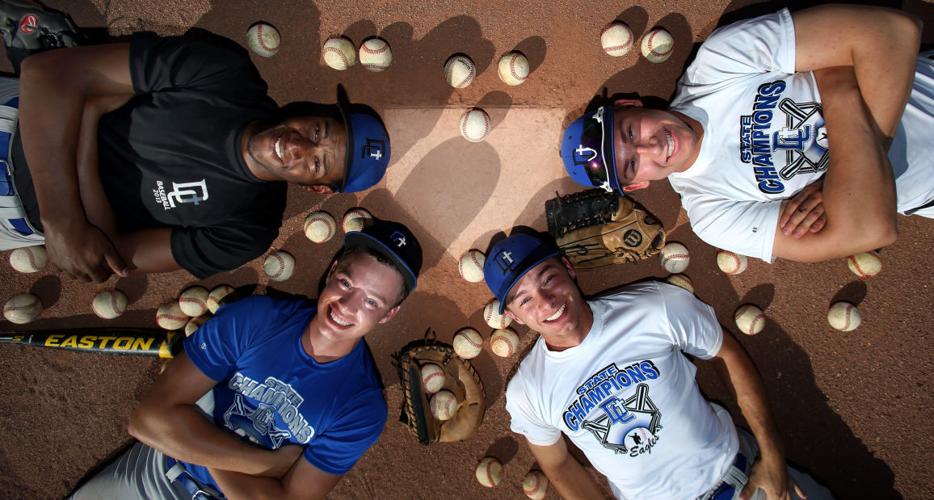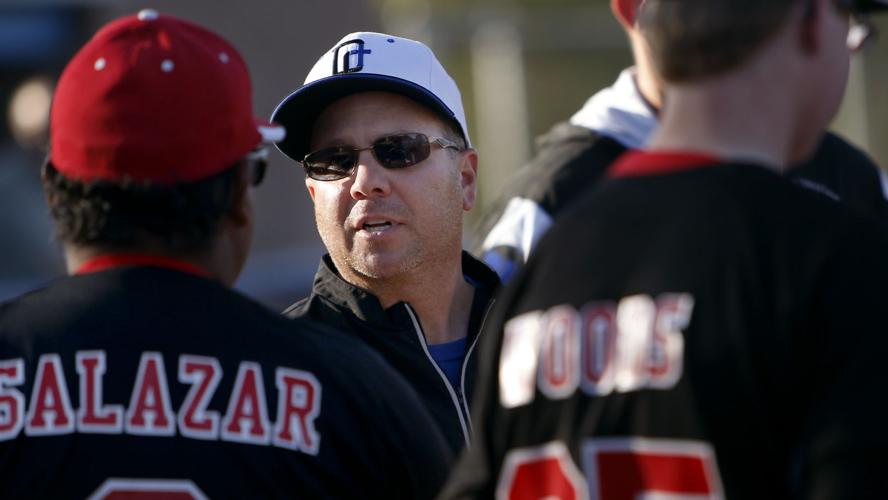It is a Wednesday night, and the sun is setting on another beautiful day in Tucson.
It is warm, but not too warm. There is a breeze.
Look out over the horizon. It’s beautiful, isn’t it? This baseball field that rose from nothing, the cement mixed and poured by a bunch of high-schoolers. It would be a field of dreams, but the name is already taken.
Grant Hopkins looks up for a moment, and there is a glint in his eye and a frog in his throat.
Three straight state championships, the first trifecta in Tucson in seven decades, and a fourth potentially coming this weekend. It’s enough to make a fella want to stick around.
Hopkins started coaching 16 years ago, when he was 27. He’s 43 now, with a wife and kids, and too many missed birthdays.
The sun is not just setting over Tucson, it appears.
•••
Desert Christian has won 111 of its 123 games over a four-year period heading into Friday’s Division IV state semifinals against Apache Junction.
It defies explanation.
Baseball is so often a game of luck. You can smash liners all day long, and if they go directly into the gloves of the fielders, well, there it all goes.
But Desert Christian doesn’t seem to have bad days or bad weeks, or even slumps.
How could Hopkins leave now?
Well, it takes time and effort to get a team to be this good. Imagine the time and effort it takes to win at a 90-percent clip.
It’s not as if the Eagles have been preternaturally blessed.
They’ve had talent, sure, but much of it departed last season. Desert Christian went 31-1 a year ago with a lineup that featured Arizona legend Zach Malis and Andrew Edwards, a stud on the mound and at the plate. But for all their accomplishments, neither was a first-round pick, or a Pac-12 or SEC-type talent.
Hopkins was interrogated before the season even started, hounded by friends and family asking him why he’d return.
What more could he accomplish? The team was expected to take a dive this season with the departure of Malis and Edwards. Maybe they’d be decent, everyone speculated.
Then Desert Christian started winning, and winning, 25-5 heading into the weekend.
Hopkins thought the pressure would ease this season, but his hair continues to change colors.
“In 2014, I wasn’t gray, and I became gray,” Hopkins said with a laugh. “My beard is all gray. I have anxiety.”
Hopkins recalled the Eagles’ second playoff game during their first championship run.
“We’re playing Williams, and if we won we’d go to semis for the first time since the ’90s,” he said. “I forgot my stomach medicine, forgot my underwear. I think, I’m so nervous right now, so I look online to help calm me down, and it recommends alcohol, and my assistants and I all laughed. Nine in the morning is a little early for drinking.”
Hopkins is a financial analyst by trade, and he’d like to go back to just being a dad again after work.
“I had a feeling going in, and after about the first month I knew,” Hopkins said. “Our AD brought me in and said, ‘I heard you might be leaving,’ and I said, ‘If there’s 35 nails that go into a coffin, I’m at 34.’ It’s hard for me to put that 35th in.”
The 35th is his family.
“It was just time to say, that’s it,” he said.
•••
OK, so now we understand how a coach could leave something he so dutifully built.
But back to this thing he built, because it’s a thing of beauty.
No, not the field, though that is, too.
A few players in the class of 2012 — Luke Cunningham, Daniel Riebe and Trevor Beck — decided to start a senior project.
Cunningham’s father is a contractor, and he helped draw up plans for a field. They got one donation, but raised the rest of the money on their own. Then they built it.
The resulting field is a thing to behold.
So is the team that plays in it.
Desert Christian’s roster is made up of 14 players, including six seniors, four of whom could be the first Tucson players in more than 70 years to exit high school with four state titles. Jacob and Zachary Rosson, Jesse Schwartz and Jonah Stiffey have been here since 2013. They could potentially end their careers with 113 wins and 12 losses.
Absurd.
“On paper, it looks crazy,” said Zachary Rosson, a catcher/pitcher who is batting .416 with 33 runs and 21 RBIs.
“(Our records) kept getting better, and we didn’t know when it was going to stop, because we knew it couldn’t continue like that forever, but luckily it still hasn’t stopped.”
Ah, so luck, there we go, luck. That explains it. Luck.
But you don’t luck your way into three titles.
It’s got to be something more.
Could it be the character classes that Hopkins pushes on his kids?
These are sit-down sessions, one week preaching discernment, the next week teaching attitude. Hopkins started the Coaching for Life lessons back in 2010, and now he calls them Character Matters. And it does here.
“I really felt it the first couple practices here,” said outfielder Jacob Rosson. “It’s really that soon. … We’ve tried to stay as humble as possible. We have our moments, but as a whole, I feel like we try to keep it down to a minimum.”
Some of the success is attributed to an abnormal dedication to advance scouting.
When the Eagles beat Pusch Ridge in 2014, the team’s coaches had already watched them play 10 times; before playing Phoenix Christian in 2013, Hopkins watched three of its games himself.
“I stood in the outfield and they didn’t know I was there,” he said.
Hopkins also has an extensive network of coaches across the state with whom he’s friendly, and he frequently trades notes.
You should see the binder for Apache Junction. It’s 20-plus pages thick.
“I tell the guys, you are not going to lose because we didn’t prepare you correctly,” Hopkins said.
In the Eagles’ 5-4 quarterfinal win over Camp Verde, they scored two runs with the bases loaded in the bottom of the sixth on a sac fly after the fielder botched the throw with all runners tagging.
That kind of philosophy breeds teamwork and camaraderie, but the Eagles take it to another level.
“Instantly when you step on the field, you feel like you’re loved,” said Schwartz, a third baseman/pitcher batting .333 with 21 RBIs.
“There have been kids who joined the kids this year, last year, and they’ve said they’ve never been on a team like this. You learn through discipline and you learn through hardships, and I guess that’s what makes us closer as a team, going through these hardships.”
They’ve bonded in other ways, too. For other reasons.
They’ve had to.
•••
Hopkins shudders remembering the phone call.
It was April of 2014, and the team was off to a roaring start. Father-and-son coaches Mike and Ryan Hanson, who’d been a major part of Canyon del Oro’s state championship run in 2009, had joined his staff. They’d brought along a winning edge.
When Ryan missed a Monday practice, Hopkins knew something was amiss.
When he missed the team’s Tuesday game against Tanque Verde, a sense of dread formed.
Then came the call on Wednesday.
Hopkins saw it was from Mike, who told him Ryan was gone, and Hopkins thought, “Gone? Gone where?” and Mike said no, he’s dead, he’s gone, and the floor just about fell from under Hopkins’ feet.
The team was devastated, but resolved.
“It gives you something to fight for, to train for, to practice for,” Schwartz said. “We had to do it for Ryan.”
Three weeks later, there was another tragedy.
It was Easter morning 2014, and Jonah Stiffey and his family celebrated the day at church, then headed home.
“A family friend came to church, and I kind of liked her, and she brought this guy with them,” Stiffey said.
“The family drove over to my house and I remember looking through the window, and making sure the guy didn’t come and I was like yes, he’s not here! And I’m pretty sure I had the mindset, I have to go show off now, and that’s when we went out on the … ride.”
Sixteen days after the death of his beloved assistant coach, Stiffey flipped his Polaris Ranger UTV and was badly injured. He suffered Level 1 brain trauma. He "coded" — flatlined — three times.
The medical helicopter was delayed in taking off for University of Arizona Medical Center because Stiffey kept drifting away.
“We were extremely scared for Jonah,” Zachary Rosson said. “We didn’t know what was going to happen in those days. We didn’t know if he’d die, if he’d wake up.”
He woke up, and in an even better shock, emerged relatively unscathed.
There are some lingering memory and focus issues, but Stiffey’s recovery was, well …
“It was a miracle,” said Stiffey, who became a starter in the outfield this season and is batting .339.
“It shouldn’t have been possible. Multiple doctors looked at me, and the specific neurologist said she was amazed I was doing as well as I was. I was able to get up and walk after two days, and she said that’s just not possible.”
For a team at a Christian school that relies heavily on its faith, this was an answered prayer.
“There was a purpose behind it, like God is telling me he has a path for me,” Stiffey said.
•••
Stiffey’s injury may have changed that 2013 squad, perhaps just as much as Hanson’s death, but another accident 24 years earlier may have set Desert Christian on this current course.
Hopkins was a high school junior then, a pitcher and a good one, the opening-day starter for the school’s very first varsity team.
They played Phoenix Indian School — “which is no longer around,” Hopkins adds — and they won.
Three days later, Hopkins was in a car accident, and a double compound fracture in his arm would sideline him for the year. He asked coach Allen Nielsen, who would go on to lead Desert Christian for 17 years, if he could help assist.
Senior year, he coached the outfielders and finally worked himself back into the lineup as designated hitter, where he batted over .500.
Sixteen years ago, he came back as an assistant, and he took over the head job in 2007.
And now, after three titles and maybe a fourth, Hopkins is ready to leave it all behind.
He makes sure to say this weekend’s games don’t mean all that much, he’s already achieved more than he’d ever thought he would – crowned by his selection as AIA coach of the year honor last year – and he adds, “One game isn’t going to define what these four seniors have accomplished.”
But four in a row?
That would be special.
“There’d be no better way, to go out like that?” he said.
“That’s why everybody said I should go out last year. ‘You’ll never have a team do this again!’ Everybody told me to leave. Leave. Leave out on top. And God called me back to do it one more year. I know there’s a reason. Maybe it’s so I can know I’m done with baseball.”
Hopkins gets up from the table to conclude the interview, and he surveys the field. He has one practice left. He smiles, and turns around.
He walks away and he doesn’t look back.





